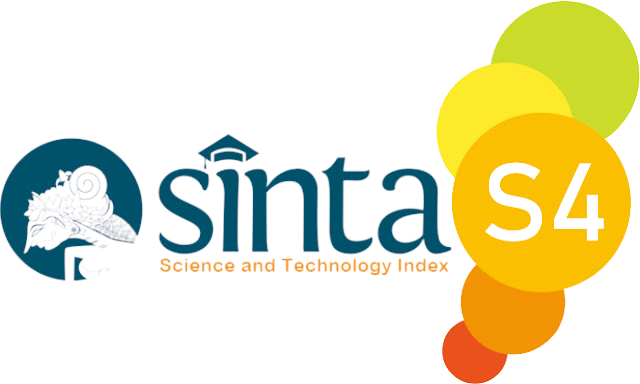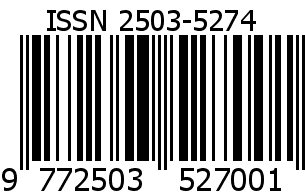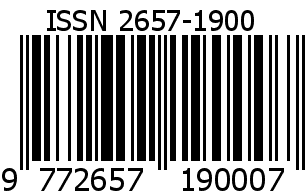ESTIMASI INTENSITAS RADIASI MATAHARI DENGAN MENGGUNAKAN JARINGAN SYARAF TIRUAN BACKPRPAGATION DI KOTA JAYAPURA
ESTIMATION OF SUN RADIATION INTENSITY USING BACKPRPAGATION ARTIFICIAL NEURAL NETWORKS IN JAYAPURA CITY
Abstract
Eastern Indonesia has enormous potential for solar energy. For the utilization of this energy, data on the intensity of solar radiation is needed that can describe the availability of solar energy that can be utilized. Information on the availability of solar energy will be used to estimate the intensity of solar radiation, so that the use of solar energy can be optimal. In this study, the intensity of solar radiation was estimated. The data used to estimate the intensity of solar radiation were air temperature, humidity, duration of solar radiation, and rainfall. The method used in this study is an artificial neural network (ANN) with backpropagation training. This study uses variations in the number of neurons in 1 hidden layer to get the best group based on the RMSE value and correlation. The best group from each training simulation is then used to estimate solar radiation. The estimation results for the city of Jayapura have an RMSE value of 1,970 kWh/m2. The solar radiation received in the Jayapura area has a high enough potential to be used as alternative energy with an average monthly radiation value of 4,5 kWh/m2.
Downloads
References
Radiasi Matahari Terhadap Performansi Mesin Pendingin Siklus Adsorpsi Tenaga Matahari.
J. Ilm. Tek. Mesin Cylind. 1(1): 8.
2 Septiadi D, Nanlohy P, Souissa M, Rumlawang FY. 2009. Proyeksi Potensi Energi Surya Sebagai
Energi Terbarukan (Studi Wilayah Ambon Dan Sekitarnya). J. Meteorol. dan Geofis. 10(1): 22.
3 Rahardjo I, Fitriana I. 2005. Analisis Potensi Pembangkit Listrik Tenaga Surya di Indonesia.
Strategi Penyedian Listrik Nasional Dalam Rangka Mengantisipasi Pemanfaatan PLTU Batubara
Skala Kecil, PLTN dan Energi Terbarukan. 43-52.
4 Widayana G. 2012. Pemanfaatan Energi Surya. J. Pendidik. Teknol. dan Kejuru. 9: .
5 Amin I, Harun N, Suyuti A. 2017. Studi Potensi Energi Terbarukan di Kawasan Timur Indonesia
Berbasis Analisis RETScreen International. J. Insypro (Information Syst. Process. 2: 1.
6 Yanti N et al. 2019. Prediksi Radiasi Matahari Dengan Penerapan Metode Elman Recurrent
Neural Network. 12(November): 2579.
7 Utomo YS. 2017. Radiasi Surya Menggunakan Data Lpm (Lama Penyinaran Matahari).
J. Mater. dan Energi Indones. 07(02): 21.
8 Octavianti A, Muliadi, Apriansyah. 2018. Estimasi Intensitas Radiasi Matahari di Wilayah
Kota Makassar. Prism. Fis. 6, No. 3(3): 152.
9 Rumbayan M, Nagasaka K. 2011. Estimation of Daily Global Solar Irradiation in Indonesia
with Artificial Neural Network (ANN) Method. Int. J. Adv. Sci. Eng. Inf. Technol. 1: .
10 Almorox J, Hontoria Fernández C. 2004. Global solar radiation estimation using sunshine
duration in Spain. Energy Convers. Manag. 45: 1529.
11 Dorvlo ASS, Jervase JA, Al-Lawati A. 2002. Solar radiation estimation using artificial neural
networks. Appl. Energy. 71(4): 307.
12 Flores JJ, Graff M, Rodriguez H. 2012. Evolutive design of ARMA and ANN models for time
series forecasting. Renew. Energy. 44: 225.
13 Örkcü HH, Bal H. 2011. Comparing performances of backpropagation and genetic algorithms
in the data classification. Expert Syst. Appl. 38(4): 3703.
14 Dewi C, Muslikh M. 2013. Perbandingan Akurasi Backpropagation Neural Network dan
ANFIS Untuk Memprediksi Cuaca. J. Sci. Model. Comput. 1(1): 7.
15 Duffie J, Beckman WA. 1980. Solar Engineering of Thermal Processes Second Edition. NASA STI/Recon
Tech. Rep. A. 81: 16591.
16 Supranto J. Statistik: Teori dan Aplikasi (Jilid 1) (Edisi 7). Erlangga. 2010.
17 Walpole R. Introduction of Statistics. 3rd Edition. Macmillan Publishing Company, New York. 1982.
18 Thoriq M. 2022. Peramalan Jumlah Permintaan Produksi Menggunakan Jaringan Syaraf Tiruan
Algoritma Backpropagation. J. Inf. dan Teknol. 1(2): 27.
Jl. Adisucipto, Penfui-Kupang, Lasiana, Klp. Lima, Kota Kupang, Nusa Tenggara Timur., Indonesia
This work is licensed under Attribution-NonCommercial-ShareAlike 4.0 International (CC BY-NC-SA 4.0)
 Presli Panusuanan Simanjuntak(1*)
Presli Panusuanan Simanjuntak(1*)
















